Our Insolvency Practitioner Statements
Our Insolvency Practitioner Statements
Blog Article
Facts About Insolvency Practitioner Uncovered
Table of ContentsTop Guidelines Of Insolvency PractitionerThe Best Guide To Insolvency PractitionerThe 9-Minute Rule for Insolvency PractitionerNot known Factual Statements About Insolvency Practitioner Get This Report about Insolvency PractitionerThe Definitive Guide for Insolvency PractitionerThe Insolvency Practitioner StatementsThe Best Strategy To Use For Insolvency PractitionerThe Best Guide To Insolvency Practitioner
This can take place for a variety of reasons, including inadequate financial monitoring, unanticipated expenses, or a change out there. If a company is financially troubled, it might be required to fold or market off properties to pay lenders. This can have a significant impact on the company, staff members, and shareholders.Why does a company enter into insolvency? There are a number of reasons why a firm might get in right into bankruptcy.
An Unbiased View of Insolvency Practitioner
Various other factors for insolvency consist of fraud, mismanagement, and unforeseen costs. When a firm ends up being financially troubled, its possessions are used to settle its debts. This can have a significant effect on the service, as it may no more have the ability to continue running. Bankruptcy can additionally cause job losses and the closure of services.
The business might be compelled to offer assets, lay off staff or even shut down. Creditors may be left out of pocket and the firm's investors might see their investment go away.
Insolvency is the process whereby a firm is ended up and its assets are sold off to pay creditors. This is usually the last resource, as it can have a really adverse impact on the firm's track record. Receivership happens when a business is unable to pay its financial debts and is placed under the control of an external administrator.
The Facts About Insolvency Practitioner Revealed
Voluntary administration is comparable to receivership, yet it is initiated by the supervisors of the firm instead than the financial institutions. This option is often utilized when a business is facing monetary troubles yet there is still wish that it can be turned about. Company bankruptcy is a complex and severe concern that can have far-ranging implications for services of all dimensions.
With the appropriate help, you can guarantee that your organization has the very best chance of weathering this difficult time. (Insolvency Practitioner)
The Buzz on Insolvency Practitioner
Whatever your factor for shutting your service, there are lots of considerations you have to deal with before 'shutting the doors'. There's likewise a great deal you can do to make the process less stressful and obtain much better results. Closing down your company is not simply concerning fulfilling the functional and legal needs.
Care for your workers As an employer, you require to check and provide assistance to your workers throughout this demanding time. Understand any feasible health and health and wellbeing problems they could experience due to: work insecuritytransitioning with the sale of the businesschange in owners. You can: There are extensively 2 circumstances in which you would voluntarily shut your company.
You likewise: don't desire to, or can't, offer the businesshave no-one to take it over. You might be closing your organization due to the fact that: it's not covering its overheads and running costsyou can't sustain the operating prices while trying to market it.
The Greatest Guide To Insolvency Practitioner
This may prevent visit this page you from coming to be insolvent or bankrupt, and help you to leave the company without any kind of long-lasting impacts. There are numerous points you need to attend to prior to shutting your service. It's important to have an exit method. Your accounting professional, lawyer or organization adviser will certainly have the ability to aid you with this.

Depending on your lawful structure, all or some of the following points could use to you when you willingly close your organization. Talk to your accountant, solicitor and organization advisor about legal demands for closing your organization.
Some Known Facts About Insolvency Practitioner.
You must finalise all tax issues for your business, also if it's no longer trading. This includes your responsibilities relating to payment of: fringe benefits taxpay-as-you-go (PAYG)superannuationemployment termination.
Bankruptcy happens when your company can not pay its debts, which can result in your business closing down. Different insolvency treatments apply to people and business.
If you try to manage it yourself, you'll require to interact with every creditor independently to try to bargain routine payment quantities. Insolvency or personal bankruptcy advisers can: assistance you with the processhelp you recognize your optionsnegotiate with your lenders on your part. They hold certain licences and certifications in this specialised field.
Insolvency Practitioner Fundamentals Explained
It's vital to acknowledge economic problem early so you can look at means to stay clear of bankruptcy. You need to additionally be mindful of creditors putting queries or defaults versus your credit rating data.
Individual insolvency for single traders and people within partnerships Individual insolvency treatments apply to: Prior to starting an individual bankruptcy process, it's important to recognize the: impact of the consequenceshow long the influence will be., likewise understood as a Component IX agreement, enables you, or the selected administrator, to negotiate with your lenders to pay a percent of the consolidated financial obligations over a duration of time to your manager, rather than you could try here attempting to continue making payments to each financial institution.
Insolvency Practitioner Fundamentals Explained
Company insolvency and liquidation An 'insolvent company' is not able to pay its financial debts or cover the price of its expenses. In some scenarios, insolvent business may go into liquidation. Liquidation is when an independent registered liquidator is assigned to take control over the firm and end up the firm service in an organized means.

The 9-Minute Rule for Insolvency Practitioner
Sonia Piccinini committed significant time and initiative in the prep work of this magazine. The sights expressed in the report are those of the IMF's Legal Department and must not be attributed to the Executive Directors or the Administration of the IMF. FRANOIS GIANVITI Current experience has actually demonstrated the level to which the lack of organized and effective bankruptcy procedures can exacerbate economic and financial situations.
Report this page